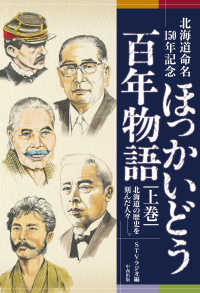- ホーム
- > 洋書
- > 英文書
- > Politics / International Relations
基本説明
An engaging, carefully considered syrvey of the conceptions of executive power in constitutional thought.
Full Description
The origins of presidential claims to extraconstitutional powers during national crises are contentious points of debate among constitutional and legal scholars. The Constitution is silent on the matter, yet from Abraham Lincoln's suspension of habeas corpus during the Civil War to George W. Bush's creation of the "enemy combatants" label, a number of presidents have invoked emergency executive power in defense of actions not specifically endorsed in the Constitution or granted by Congress. Taking up the debate, Clement Fatovic digs into the intellectual history of the nation's founding to argue that the originators of liberal constitutional theory explicitly endorsed the use of extraordinary, extralegal measures to deal with genuine national emergencies. He traces the evolution of thought on the matter through the writings of John Locke, David Hume, William Blackstone, and the founding fathers, finding in them stated support for what Locke termed "prerogative," tempered by a carefully construed concept of public-oriented virtues.
Fatovic maintains that the founders believed that moral character and republican decency would restrain the president from abusing this grant of enhanced authority and ensure that it remained temporary. This engaging, carefully considered survey of the conceptions of executive power in constitutional thought explains how liberalism's founders attempted to reconcile the principles of constitutional government with the fact that some circumstances would demand that an executive take normally proscribed actions. Scholars of liberalism, the American founding, and the American presidency will find Fatovic's reasoned arguments against the conventional wisdom enlightening.
Contents
Acknowledgments
Introduction
1. "So Many Unexpected Things": Contingency and Character in Modern Political Thought
2. "Without the Prescription of the Law": Virtue and Discretion in Locke's Theory of Prerogative
3. "All Was Confusion and Disorder": Regularity and Character in Hume's Political Thought
4. "The King Can Do No Wrong": Blackstone on the Executive in Law
5. "It Squints towards Monarchy": Constitutional Flexibility and the Powers of the President
6. A "Patriotic and Dignifying President": Republican Virtue and the Presidency
Conclusion
Notes
Index








